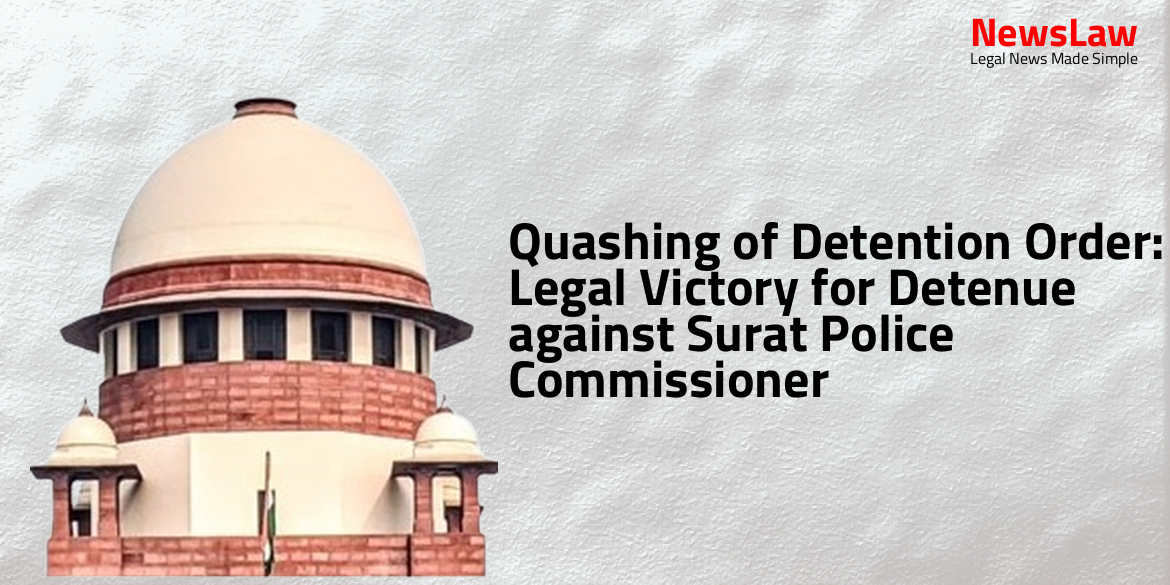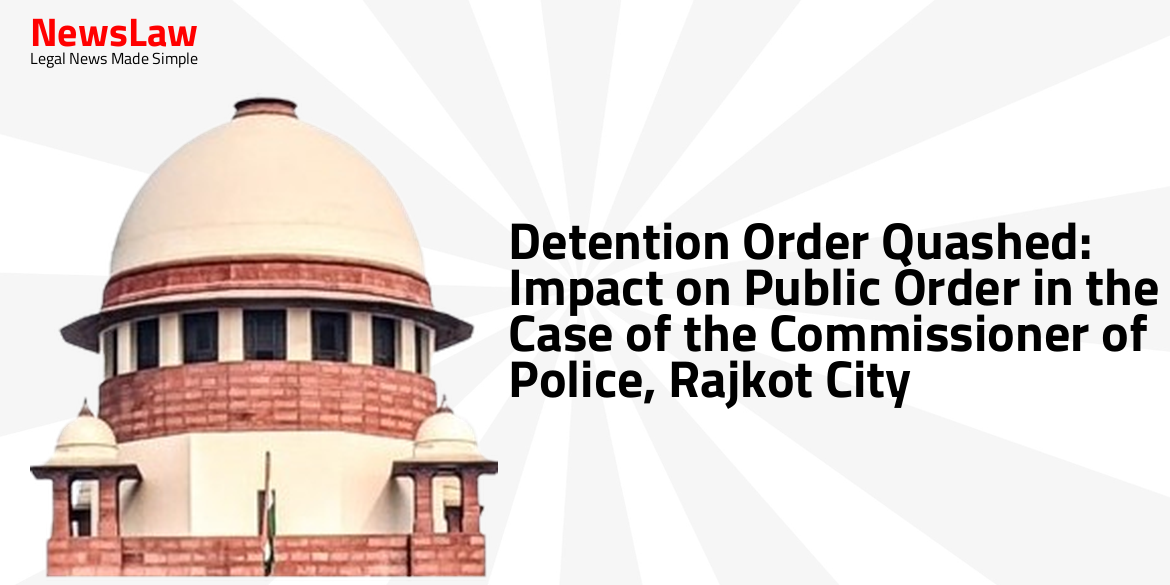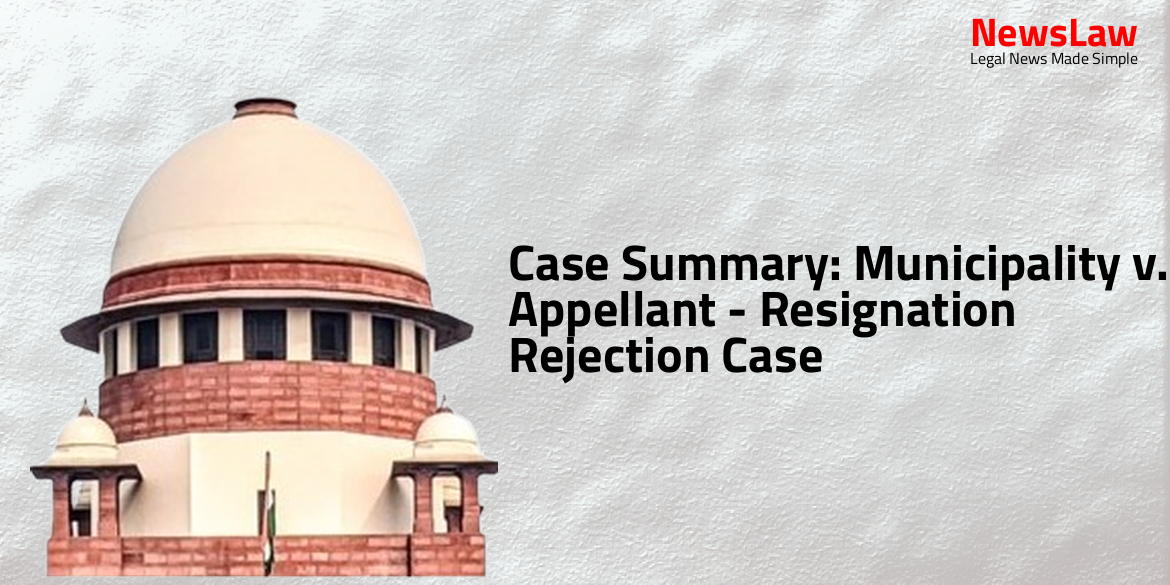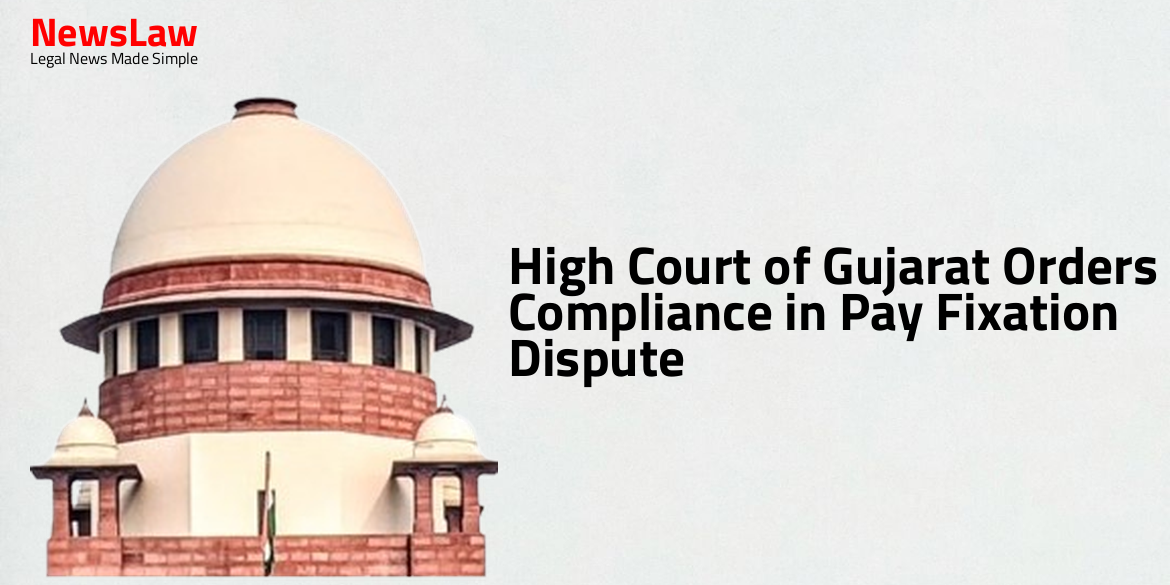In a significant legal development, the Gujarat High Court has delivered a judgment quashing the detention order dated 16.11.2023 passed by the Surat Police Commissioner in a case involving serious allegations against the detenue. The Court’s decision highlights the importance of distinguishing between law and order issues and disturbances impacting public order. Stay tuned to learn more about the implications of this ruling for preventive detention cases. #DetentionOrder #LegalVictory #GujaratHighCourt
Facts
- The petition is filed seeking the quashing of the detention order dated 16.11.2023 passed by the Police Commissioner, Surat.
- The petitioner challenges the detention order on the grounds that registration of offences under IPC and Arms Act alone does not meet the criteria under section 2(c) of the Act for detention as a ‘dangerous person’.
- The illegal activities alleged against the detenue are argued to not be connected to the maintenance of public order but rather considered as a breach of law and order.
- The counsel for the detenue argues that no other relevant material on record connects the alleged anti-social activity with breach of public order besides the FIRs and Panchnama drawn during investigation.
Arguments
- It is argued that the offences committed by the petitioner do not amount to a breach of public order, as they pertain to the theft of muddamal articles belonging to private individuals.
- The detention grounds do not indicate that the petitioner’s actions have caused disturbance to public order.
- The option of cancelling the petitioner’s bail was available to the detaining authority.
- The advocate for the petitioner asserts that the petitioner’s activities in relation to the criminal cases did not disrupt the harmony of society.
- Petitioner’s advocate argues that illegible documents supplied by detaining authority invalidate subjective satisfaction.
- Cites a case where blurred and incomplete documents led to quashing of detention order by the Apex Court.
- AGP contends that secret witness statements were not referenced in grounds of detention, deemed unnecessary for subjective satisfaction.
- AGP highlights the nature of offenses under IPC chapters as basis for dangerous person classification under PASA Act.
Analysis
- The Preventive Detention Act requires a distinction between serious and aggravated forms of disorder affecting the community and minor breaches of peace of local significance.
- Mere disturbance of law and order is not enough for action under the Act; only disturbances affecting public order are covered.
- Allegations in FIRs must be relevant to public order to justify detention under the Act; other penal laws can address minor offenses.
- Detention under the Act requires evidence that the person poses a threat to society’s overall harmony.
- Reference to the case of Pushker Mukherjee v. State of West Bengal for the distinction between ‘law and order’ and ‘public order’.
- The Supreme Court’s clarification that ‘public order’ pertains to specific categories of infractions, not every type of disorder.
- Detaining Authority did not consider the option of cancelling bail, which could have been a sufficient measure.
- Acts of assault or injury to specific persons do not always lead to public disorder.
- The right to make representation is a fundamental right of the detenu under Article 22(5) of the Constitution.
- Supply of illegible documents deprived the detenu of making an effective representation.
- Denial of legible copies of documents relied upon makes the detention order illegal.
- The detaining authority did not address the issue of illegible or blurred copies supplied to the detenu.
- The detenu is entitled to legible copies of documents relied upon for effective representation.
- The detention order did not reflect the consideration of the detenu being on regular bail.
- Detention without considering the cancellation of bail was not justified.
- The subjective satisfaction would stand vitiates as per the recent decision of the Hon’ble Supreme Court in Shaik Nazeen v/s. State of Telanga and Ors reported in 2023 (9) SCC 633.
- The Hon’ble Supreme Court observed that seeking shelter under preventive detention law is not the proper remedy under the present circumstances.
- The Court found that certain pages relied upon by the detaining authority for passing the detention order are illegible (Page Nos. 229, 277, 281, 311, and 317).
- Referring to the case of Buyamayum Abdul Hanan @ Anand, the Apex Court highlighted the importance of legibility in the documents relied upon for detention orders.
- Respondent no.1 was not denied the opportunity to make effective representation while questioning the order of detention.
- Failure to raise a specific question before the detaining authority does not take away the right of the detenu to challenge the order of detention under Article 226 of the Constitution.
- Personal liberty and individual freedom cannot be arbitrarily taken away without following due process of law.
- The detenu was able to satisfy the High Court that the grounds of detention did not meet the required standard of proof, allowing him to make an effective representation under Article 22(5) of the Constitution.
- The lack of a counter affidavit from the detaining authority renders the averments made in the petition unchallenged and uncontroverted.
Decision
- Direct service is permitted for the petition.
- The petition is allowed as registration of FIR/s alone cannot be linked to the breach of public order.
- No other relevant material exists to invoke power under section 3(2) of the Act.
- The impugned order of detention dated 17.11.2023 is quashed and set aside.
- The detenue is to be set at liberty immediately if not required in any other case.
- Rule is made absolute accordingly.
Case Title: MAHENDRA S/O JUVANSINGH MINAVA Vs. STATE OF GUJARAT
Case Number: R/SCA/6820/2024



